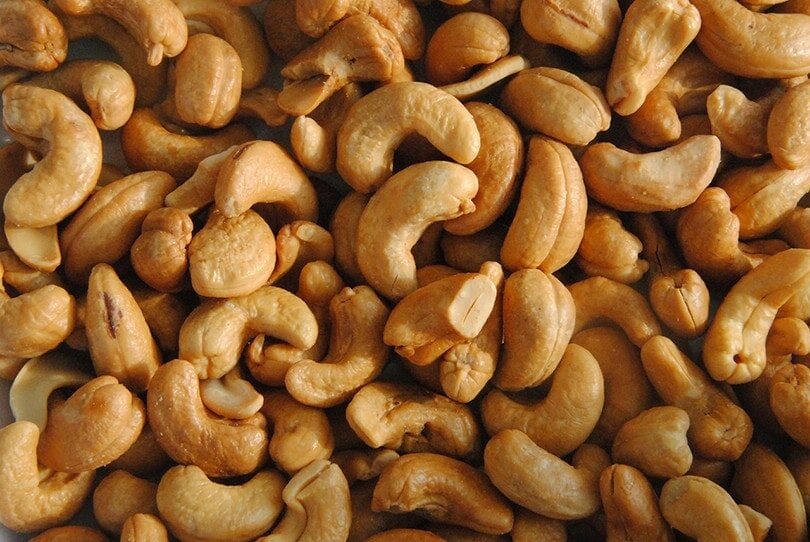
[ad_1]

If you have a cat, you’ve probably experienced their eerie stare as you sit down to enjoy a snack. It’s the sort of unblinking gaze that pierces right through you. Despite the stoic glare, it’s obvious when our cats want a nibble of whichever food we’re chewing on whether it’s nuts, fruit, or something else.
Cashews are crunchy, light, and a simple food to eat when we’re too busy to spend time preparing something more substantial. It can be surprising to learn cats can eat cashews, too. There are no real health benefits in the nuts for our feline friends, but a tiny morsel won’t hurt your cat.
As with most human food, especially anything that isn’t meat, if you do feed your cat cashews, make sure they don’t become a large part of their diet. Cats are obligate carnivores and should be fed primarily on meat. Unlike dogs, they can’t process a lot of plant matter like fruits, vegetables, and nuts.
What are the Risks of Feeding your Cat Cashews?
While there aren’t any health benefits to cats eating cashews, there are several risks involved in feeding them these nuts. Cats need a high protein diet to remain healthy and, despite cashews having a high-protein content, most of your feline’s nutritional needs should come from meat products.
Cashews are also high in fat and are often covered in salt making them an unhealthy addition to your cat’s diet, especially since cats don’t require much sodium. A small bite won’t do much harm but avoid feeding your cat too many. Not only can an overdose of cashews cause stomach upsets and diarrhea, but they can also cause pancreatitis.

Can Cats Drink Cashew Milk?
Among many of the nut-based products out there, cashew milk is one of the more popular alternatives to dairy alongside almond and soy milk. Your cat can drink cashew milk; however, you should use the same caution when feeding them cashew nuts.
Cashew milk, and other milk made from nuts, contains a lot of fat. Too much for your cat’s nutritional needs. A sip now and then won’t hurt your feline best friend but it won’t give them any obvious benefits either. Cats can also be allergic to certain nuts, including cashews, and it’s best to avoid foods you know will harm your cat, especially if they have a serious reaction to certain foods.
What Other Nuts are Safe for Cats?
Although they might not be the best choice for your cat nutrition-wise, nuts are often falsely believed to be toxic to our pets. Some aren’t recommended at all while others are okay, provided you carefully monitor your cat’s intake and don’t give them too many.
Besides cashews, other nuts your cat can eat include:
While none of these nuts are toxic to your cat, they’re all high in fat and often flavored with sodium. Overfeeding them can cause stomach upset, diarrhea, and pancreatitis in the same way cashews can.
Peanuts and pistachios aren’t proven to be safe for your cat but they’re not considered toxic either. Remember to remove the shells first if you do feed them to your cat to avoid the risk of choking.
As for macadamia nuts, it’s probably a good idea to avoid them completely. They’re known to cause health issues in dogs and, although it’s difficult to say whether they have the same effect on cats, it’s best not to risk it. Play it safe and if you’re not sure, give your cat specially designed cat treats instead of the nuts you’re snacking on.

What Foods are Toxic to Cats?
Cats might be able to eat nuts in small quantities even if they don’t have any nutritional value to them. There are many human foods your feline shouldn’t eat at all:
Fat trimmings, eggs, raw meat, and fish are also something to be wary of. If they’re not prepared properly they can cause pancreatitis, E. Coli, diarrhea, Salmonella, or vomiting.
Final Thoughts
If you’re eating a few cashews and your cat won’t stop staring at you with those hungry eyes of theirs, it won’t hurt to toss them a small piece. Cats can eat several types of nuts, including cashews, but they should only be an occasional treat.
Along with the high-fat content, cashews also contain high levels of sodium and if your cat eats too many, it can suffer from several health issues, including pancreatitis.
When giving your cat treats, it’s always safest to stick with specialized cat treats to ensure your feline’s nutritional needs are met. Your cat’s diet should mostly consist of protein from animals so they can have a healthy and balanced diet.
Featured Image Credit: Michael_Luenen, Pixabay
[ad_2]
Source link


